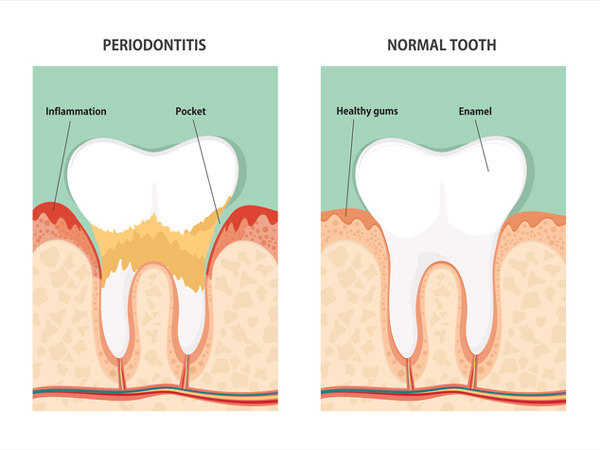Gum Disease
Gum disease, or periodontal disease, is an inflammation of the gum tissues that can progress to impact the surrounding bone structure that supports your teeth negatively. The infection is caused y plaque, a thick, sticky deposit on the teeth in which tooth-eating bacteria proliferate.
Fortunately, at Tualatin Family & Cosmetic Dentistry, we can help you stop gum disease in its tracks and reverse its effect.

TYPES OF GUM DISEASE
If plaque and tartar are not removed properly, it can lead to gingivitis. Left untreated, the disease can advance to periodontitis, which has severe repercussions.
Gingivitis
Gingivitis is the earliest stage of the periodontal disease characterized by slightly swollen gums which can bleed during brushing. There is little discomfort at this stage. Gingivitis is caused by improper oral care, but can, fortunately, be reversed with professional treatment at Tualatin Family & Cosmetic Dentistry.
Periodontitis
If gingivitis is left untreated, it can lead to periodontitis. Over time, plaque will extend to the gum line and irritate the soft tissue there. The toxins produced by the bacteria trigger a chronic inflammatory response in which the body turns on itself and start destroying the gum tissue and the supporting tooth structure. As a result, gums start receding from the teeth, forming deep pockets, which become filled with bacteria and infection. As the disease progresses, the pockets become larger and more and more gum, and bone tissue is destroyed. Eventually, teeth may become loose and fall out.
Periodontitis has many forms. The most common ones are:
- Aggressive Periodontitis: Generally, gum disease is rare in children, but some children and adults do develop aggressive periodontitis, even though they may be otherwise healthy. This disease can occur in children even younger than 3 years old. By age 20, people with aggressive periodontitis lose their teeth. Subtypes of aggressive periodontitis include localized juvenile periodontitis that results in excessive bacterial colonization. Another rare condition is known as prepubertal periodontitis, which impacts children shortly after their baby teeth start to appear. Common symptoms include swollen, red and bleeding gums, pus, and unpleasant breath.
- Chronic periodontitis occurs in adults and is the most common form of periodontitis. This gum disease is characterized by severely swollen gums that bleed profusely and gum recession. Formation of deep pockets can occur slowly, but rapid progression can also occur.
- Necrotizing Periodontal Disease: Also referred to as acute necrotizing ulcerative gingivitis, this is the most severe form of gum disease. The condition can result in the death of gingival tissue, ligaments, and the alveolar bone. This disease is most commonly seen in people who are malnourished or who have compromised immune systems, like HIV/AIDS patients.
RISK FACTORS FOR GUM DISEASE
Although the major and most common reason for gum disease is plaque, there are many other factors that affect the health of your gums, including:
- Age: 70% of Americans older than 65 years have periodontitis.
- Tobacco: Tobacco use is associated with periodontal disease, as well as mouth cancer and lung disorders, among others.
- Genetics: People who have a genetic tendency for gum disease may get periodontitis despite very good oral health care.
- Stress: Stress makes it difficult for your body to fight off infection, resulting in numerous health problems, including periodontal disease.
- Medication: Antidepressants, oral contraceptives, and some heart medications can cause oral health issues.
- Chronic Disease: Systemic diseases like diabetes, rheumatoid arthritis, and heart disease can exacerbate inflammation in the body, leading to periodontitis.
- Obesity: A diet that is low in essential nutrition may not just make you gain weight, but it also causes inflammation and affects your immune system, resulting in an increased risk of periodontal disease.
Gum disease may seem terrifying, but you can take it as a wakeup call to embrace proper oral hygiene. Proper brushing and flossing at home can effectively remove plaque, and food debris from your mouth and regular dental checkup visits at Tualatin Family & Cosmetic Dentistry can nip away any budding issues.
Call us at (503) 878-7474 to schedule an appointment today.